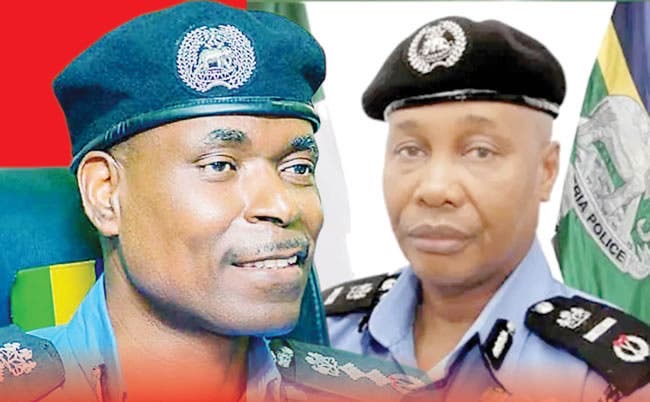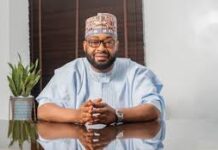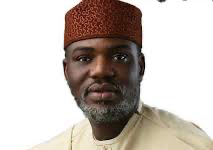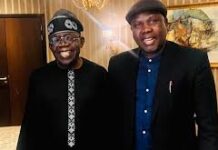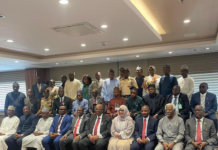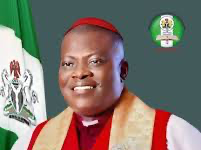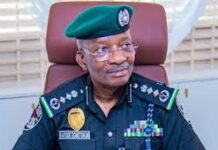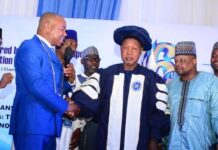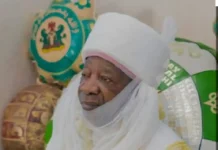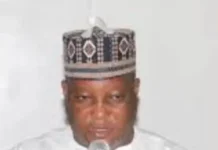Power Brokers And Police Leadership
POLITICS DIGEST – Lanre Adewole writes on the underlining issues concerning the appointment of Inspector Generals of Police over the years.
Since his 2019 scripted exit from the Nigerian Senate, Senator Shehu Sani, has become a Twitter terror to his targets, including his erstwhile colleagues in the power corridor. Whenever the aim is for the presidency and President Muhammadu Buhari, who was supposed to protect him from his political enemies in Kaduna State, regardless of how low he is shooting and the dangerous spot(s), he has chosen, he is always subtle.
On Wednesday, as information highway and public discourse spaces rumbled over the controvesy-laden, acting appointment, of new Inspector General of Police by President Buhari, Sani slid in again, with his usual caustic delivery, but aptly capturing the fresh babble over the President’s decision, to favour another northerner in Usman Alkali Baba, over others.
He tweeted: “Surveyor General of the Federation was appointed last year from the South-West, Arewa and Ohanaeze refused to protest or even object”.
A follower, who was obviously lost to the teaser, challenged the senator to name another “major” appointment to Southern Nigeria by Buhari and the senator replied, “Post-Master General of the Federation,” triggering a flurry of comments, disavowals, hot exchanges, among supporters of the current administration and those vilifying it, for continuing in what has now been described as a culture of nepotism.
Just like Sani’s brain-game suggests, certain public offices have always attracted extra attention and expectedly, a lot of individual, sectoral, group and ethnic interests, due to the influence their occupiers command on the polity. However, at no time in recent history of Nigeria, has this extra attention become so pronounced, due to the persistent allegations of President Buhari always favouring his own from the North, when appointments to such “chummy” offices, are to be made.
The alleged northernisation and Fulanisation agenda, being allegedly pursued by the administration, which has been hyped by prominent Nigerians, including the likes of former President Olusegun Obasanjo, Nobel Laureate, Professor Wole Soyinka, Bishop Matthew Hassan Kukah, as well as prominent bodies like Christian Association of Nigeria (CAN), pan-Yoruba group Afenifere, among others, has also become a sour perspective in engaging Buhari’s major appointments and it is that gaping hole that Baba’s appointment has coolly walked into.
When President Buhari controversially extended the appointment of immediate IGP, Mohammed Adamu in January, even the Nigeria Bar Association took judicial issue with him, joining the popular chorus the extension was illegal. The general suspicion then, especially down South and among Christians, was that the President wanted to continue in his alleged tenure-long lopsided appointment style, since it was a Christian Southerner AIG (now DIG) Moses Ambakina, Jitoboh from Bayelsa State, that would appear most-fitted, to mount the policing saddle, going by the stipulation of the Police Service Commission Act.
Like Police, like DSS, like Civil Defence.
Those preempting the President, pointed at a similar scenario in the appointment of new Commandant General for the Nigerian Civil Defence Corps (NSCDC).
After the immediate CG, Abdullahi Gana had bagged a controversial six-month extension, he eventually retired on January 17, 2021 and handed over to the most senior officer Hillary Kelechi Madu, DCG Operation. Twenty-four hours after, Gana, was directed back to office by Buhari’s government, again, depriving a southern Christian, an opportunity to head and lead a major quasi-security agency, in the country.
By the time Gana eventually left in February, another northern Muslim Ahmed Abubakar Audi, was brought in as the CG, shutting the door against Madu.
The NSCDC saga.
As acting President when his boss was on a similar medical sojourn abroad as he currently is, Yemi Osinbajo, Vice President of Nigeria on August 7, 2018, fired the seemingly-powerful relative of the President and then Director General of the Department of State Services, Lawal Daura and appointed Bayelsa-born Matthew Seiyefa as the acting DG, due to the infamous “Capitol invasion” when Bukola Saraki was Senate President, by Daura boys.
Despite Seiyefa being the most senior, he was sent packing by the returnee-President on September 14, who eventually installed Yusuf Magaji Bichi, as the substantive DG.
Again, just like Jitoboh, another kinsman of former President Goodluck Jonathan, a Southern Christian, was denied, the opportunity of heading and leading a major security agency.
The judiciary, which is seen as the “second leg” of the security community, has also had its share of appointment controversy under Buhari, with the most telling, being the infamous sacking of a sitting Chief Justice of Nigeria from the South, Justice Walter Onnoghen, the poorly-disguised official move to enthrone a junior Northern jurist as the.
President of the Court of Appeal, at the expense of his senior colleague and most senior. An uproar, even from a section of the Northern political establishment, eventually forced the hand of the Federal Government, to appoint the incumbent, Justice Monica Dongban-Mensem, a Middle-Belt Christian.
For those railing against Baba’s acting appointment, the two dominant complaints are the issue of morality and constitutionality.
Why Buhari won’t change —Ozekhome
For constitutional lawyer and Senior Advocate of Nigeria, Chief Mike Ezekhome, the latest episode in the appointment trend, seals the alleged northernisation of the Nigeria Police, by Buhari.
In a lengthy hurried op-ed, he reasoned: “Such an appointment as just happened, before the new Acting IGP, is capricious, arbitrary, whimsical, unconscionable, illegal, unlawful, wrongful and unconstitutional. It eulogises strong men rather than strong institutions. Today, (Tuesday), Buhari has again appointed DIG Usman Alkali Baba, a Northern Muslim, as Acting Inspector General of Police, to replace Adamu Mohammad, another Northern Muslim. With Muhammad Maigari Dingyadi , another Northern Muslim as the Minister of Police Affairs, the circle of policing in Nigeria is complete.
“Of course, Buhari controls the Police by virtues of sections 214, 215 and 216 of the 1999 Constitution. It is the same situation with the Ministry of Petroleum Resources and NNPC, the entire security architecture of Nigeria and other key sectors and commanding heights of the economy. The illogical and puerile argument is always that the president only appoints people he can trust and that such persons are qualified in any event. That argument is insulting and insensitive to the intelligence, sensibilities and plurality of Nigeria.
“By the way, can’t President Muhammadu Buhari for once, just for once, in his opaque appointments, look beyond his religion and immediate and forsake sectionalism, cronyism, prebendalism, tribalism, favouritism, and act as a true statesman? Is he truly saying he cannot trust any of the other over 15 million Nigerians who voted for him, or that he cannot find any of them that is qualified to be made an IGP?
“I thought he gleefully told Nigerians on 29th May, 2015, while taking his first oath of office, that he was for “everybody and for nobody”? So, Buhari had actually deceived Nigerians and is desecrating his solemn oath of office? So, he just wanted power for the sake of it, after three serial failures in 2003, 2007 and 2011, leading to him even weeping publicly, swearing never to contest again?”
What the Police Act says…
Read Also:
In a January 29 op-ed, first published by Daily Trust, Sulaiman A. Abba did a comprehensive analysis of the choices before the President. The intervention, titled “IGP Succession Bid: What The Police Act Says”, the writer, said, “The Nigeria Police Force (NPF) is the principal law enforcement and lead security agency in Nigeria with a staff strength of about 371,800 and a current plan to update to 650,000 by recruiting 280,000 new hands. Constituting instruments for the Force are: Section 214 of the 1999 Constitution of the Federal Republic (as amended) and the Nigeria Police Act 2020. Quite expectedly, weeks to Adamu’s retirement, the issue of a likely replacement had taken a centre-stage and throwing fresh questions unto the nation’s succession planning process.
“In 2020, the NPF underwent major overhauls when President Muhammadu Buhari, in a memo dated September 16, 2020, communicated his assent to the Nigeria Police Bill, 2020 to the National Assembly. Specifically, the new Police Act provided among others, that a person to be appointed IGP shall be a senior police officer not below the rank of an Assistant Inspector General of Police (AIG), with the requisite academic qualification of not less than a first degree or its equivalent in addition to professional and managerial experience.
“Part 111 Section 7 (6) of the Act, which repealed the Police Act Cap. P19, Laws of the Federation of Nigeria, 2004, prescribed a four-year single tenure for a person appointed to the office of the IGP subject to the provisions of clause 18 (8), which stipulates that every police officer shall, on recruitment or appointment, serve in the Nigeria Police Force for a period of 35 years or until he attains the age of 60 years, whichever is earlier.
“The key requirements for eligibility as intended by the Act can, therefore, be safely summarised as educational qualification and experience, at least four remaining years in service and rank. Statutorily therefore, three DIGs Aminchi Baraya, Ibrahim Lamorde, and Nkpa Inakwu and 10 AIGs Hosea Karma, Mohammed Mustafa, Jonah Mava, Olushola David, Yununa Babas, Nkereuwem Akpan, Olafimihan Adeoye, Agunbiade Lasore, Undie Adie and Olugbenga Adeyanju are scheduled to exit the Force with Adamu on February 1. “Also as per the provisions of the Police Act 2020, all the three DIGs and two AIGs in the race for the office of IGP have been caught in the web of the hurdles as none of them has four more years left in the service a statutory prerequisite for eligibility. While DIG Sanusi Lemu is scheduled to quit the police force on January 30, 2023, DIG Usman Baba and DIG Dan-Mallam Mohammed will leave on March 1, 2023 and December 18, 2023 respectively. This limits the scope of choice to three Deputy Inspectors General of Police, two Assistant Inspectors General of Police and a Commissioner of Police recently deployed as acting Assistant Inspector General of police, Force CID Annex, Lagos. They include DIG Sanusi Lemu, DIG Usman Alkali Baba, DIG Dan-Mallam Mohammed, AIG Hafiz Inuwa, AIG Garba Umar and CP Dasuki Galadanchi, who recently completed a course at the National Institute of Policy and Strategic Studies (NIPSS), Kuru, Plateau State.
“As the general practice has been in the country the position is usually filled by a serving AIG, while those on the rank of DIGs are retired along with the IGP. Thus, going by this standard practice, it becomes apparent that majority of the 23 officers in the AIG cadre have less than two years to serve in the capacity as IGP when so appointed due to the unquestionable facts that either by age or longevity in service they must retire as at when due. Also, the chances of the two candidates believed to be favoured by the retiring IGP in conjunction with two other retired AIGs as likely successors; AIGs Garba Umar and Hafiz Inuwa become jeopardized as both are caught in the disqualification web of the provisions in the new Police Act on remaining years of service. While AIG Garba Umar has May 15, 2023 as retirement date, AIG Hafiz Inuwa is expected to exit on March 21, 2024. Others said to be in contention for the job but have no requisite four years are AIG Dan-Mallam Mohammed and Zanna Ibrahim. Dan-Mallam was born on January 1, 1963 and enlisted in the police on March 15, 1988.
In the meantime, the only senior police officer of northern extraction who is not entangled by the provisions of the Police Act is Dasuki Galadanci, a Commissioner of Police who is due to retire on March 3, 2025. CP Dasuki, is number two in seniority on the staff list among the 97 commissioners of police currently in service. Galadanci is currently the AIG in charge of Force CID annex, Alagbon Close, Lagos State.
“Another officer among the current 29 AIGs that could have scaled the hurdles of the provision of the Police Act 2020, Moses Jitoboh has inadvertently been promoted to the rank of DIG expected to be endorsed at the next PSC meeting. Born on June 1, 1970, AIG Jitoboh who hails from the southern flank of the country still has nine years in service, but after attaining the DIG, he too would be out of the match and out of the cup. This would in the end, render the choice for the next IGP a matter between legitimate claimants and opportunity seekers.”
A cancelled culture?
The anger in the South is mostly about the perception that Jitoboh, was deliberately promoted out of relevance and the top job and now has to leave the Force, prematurely as a DIG, despite not due for retirement until 2029. But there are questions also being asked about his “unusual” enlistment and “rapid” promotion, especially under former President Jonathan, who is being accused of propping him, to eventually land the top-job, which has now eluded him.
Jitoboh is about 50 years of age, enlisted into the Nigeria Police on the 10th of June 1994, and is expected to retire on the 10th of June 2029. He was about 23 years when he joined the Force. Though all DIGs would have to go now that a junior is being appointed, there is already a subtle campaign that Jitoboh is in acting capacity as a DIG, yet to be confirmed by the Police Service Council. That may save his neck.
Before his appointment as acting DIG in charge of Research and Development in the Force Headquarters, he had been Commissioner of Police in Adamawa State and AIG in charge of Border Patrol. He was an AIG like the acting IGP, before his sudden promotion, which is being read as a ploy to take him out, to appoint his colleague.
While being a DIG may be a baggage for Jitoboh now, the unmistaken fact in the entire appointment brouhaha, is the breach of the Police Act, which the President himself, signed into law.
As the controversy rages in the public space, what appears as a pushback has also gone viral, detailing IGP appointments since the return of democracy in 1999 and how Southern Nigeria, has benefited more than the North.
According to the survey presented, it is a split between North and South, of six IGPs each, but 12 years have been counted for South, against North’s cumulative 10.
Musiliu Smith, from Lagos, had the office, between 1999 and 2002, Mustafa Adebayo Balogun, from Osun State, was in office between 2002 and 2005, Sunday Ehindero (2005 – 2007), Mike Mbama Okiro (2007 – 2009) and Ogbonna Okechukwu Onovo (2009 – 2010).
On record, former President Obasanjo didn’t appoint any IGP outside the South.
Hafiz Ringim took it, from 2010 to 2012, Mohammed Dikko Abubakar (2012 – 2014), Suleiman Abba (2014 – 2015) and Solomon Arase (2015-2016).
On record, Jonathan, as president, appointed two northerners and one southerner.
Buhari is yet to appoint a southerner since Arase left, moving from Ibrahim Kpotun Idris (2016-2019), to Mohammed Adamu (2019-2021) and now Usman Alkali Baba.
Of the four presidents since the return of democracy, only Jonathan proved what could pass as a nationalist.
Another argument against Jitoboh is that Baba is wide his senior in the Force, though they were both AIGs at a time and seniority could count in favour of the acting IGP, though Jitoboh’s supporters are alluding to the appointment of Kpotun as a perfect fit to have him, in.
It remains to be seen if the alleged constitutional breaches pointed out in the appointment of Baba, would be challenged, especially by state governors who form the majority of the ratifying body; the Nigeria Police Council.

